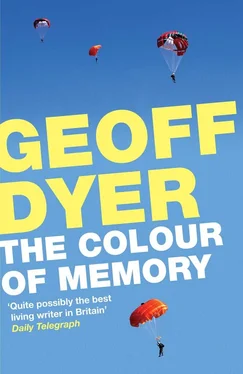The regular drinkers talked stoically about what happened. Spend enough time in pubs and you get used to most things. After a while you’re unlikely to see anything that you haven’t seen before. Someone said: ‘Get into a fight round here and you’d better be prepared to die of it.’
I drank my beer and didn’t speak to anybody. I was thinking about my liver and kidneys doing whatever it is they do invisibly and without complaint. I hoped I would never get stabbed. Or get my nose broken, or my jaw, or my teeth knocked out or my face slashed with a stanley knife. But most of all I hoped I would never get stabbed.
At home I watched Mike Tyson smashing the shit out of someone and then listened to Callas singing Lucia . As I listened I knew that nothing could be as perfect as the memory of her voice, not even love or betrayal — especially not love or betrayal. Maybe, to her, that was the meaning of tragedy; maybe that was the meaning of all tragedy.
We were travelling by taxi from a party in north London: Steranko, Foomie, Freddie, Belinda and I. After about ten minutes the driver pulled over and said the engine was fucked. We bailed out over Westminster.
It was one thirty in the morning. The sky was almost purple. A slight mist. We cut through St James’s Park, passing a flotilla of ducks. Nothing moving, not even the dappled lights on the surface of the pond. We walked along an avenue of trees and caught dark glimpses of statues. Foomie and Steranko were walking slightly ahead of the rest of us; her arm was through his, her head angled slightly towards him. We passed a bulbous, black statue of Churchill.
A few minutes later Foomie called out: ‘Look, Christmas!’ and pointed to a Christmas tree decorated with red, yellow and blue bulbs.
We walked through Whitehall, through all the empty architecture of power with its austere ornamentation and inscrutable attractiveness. Wide streets, discreet trees. A sign said ‘Churchill’s War Cabinet’ and an arrow pointed down some steps. The whole area had the feel of a museum. Suddenly we were tourists. There was no one else around.
The windows in the buildings did not look like windows. They shared the same texture as the walls and were not there to be looked in to or out of. What impressed most about the walls was the suggestion of discreet thickness. There was only one impulse behind these buildings: they were built to last — and to last it was necessary not only to be impregnable but also to impress. Vandalism was not even an issue. These buildings created their own time. They did not defy time, they consolidated it. Their foundations were deep in an unshakeable past; their walls were the habitation of a perpetual present. The buildings had turned the symbolic power invested in them into an active, brooding patience that rendered surveillance superfluous. The archaicism of the buildings was the chief source of their potency. The buildings had the same weight — the same feel — as the war memorials we passed: solid, carefully angled blocks of rock on whose sides the names of men had been scratched. Even the pavement felt more permanent here.
The streets commanded respect. Most things were out of the question here. All sound except that of the ministerial clack of steel-tipped Oxfords and brogues briskly mounting steps was inappropriate. Steps. All the time our tread was led persuasively upward. We felt that we were being drawn towards the heart of something without ever arriving there. A sense of conviction grew. Each street or arrangement of steps led to a statue: a rearing horse, a hussar waving a sword, an august statesman surveying the streets and stamping them with unbending authority.
The sound of Foomie’s laughter floated back to us on scarves of breath. We walked towards Big Ben. Looking up we saw first the vertical, black railings; then the chaotic branches of bare trees; behind the branches was the intricate decoration of Parliament; above that the sky which, oddly, still seemed purple.
We walked past a square manhole cover. Sharp green light glinted through two small access holes. Curling our fingers through these holes Steranko and I pulled back the cover. Immediately, like the glare from a treasure chest of jewels, our faces were bathed in electric lime-coloured light. A metal ladder ran down from the pavement to the green-bathed room below. A single red dial winked silently in the green room, as obvious as a drop of blood on grass. Extending from this room a small tunnel ran beneath our feet, at right angles to the kerb.
‘What is it?’
‘I don’t know.’ We lowered the cover, careful not to trap our fingers.
‘What do you think that was?’
‘I don’t know.’ It was impossible to say. My eyes were still recovering from the green glare.
We walked across Westminster Bridge. The river was oily, dark and full of harm.
‘Crossing a bridge is always romantic,’ said Belinda. ‘I wonder why?’
‘Whistler,’ said Freddie.
‘Sometimes when I walk over a bridge I have this fear that I’m going to throw all my money over the edge,’ I said. ‘I get it on boats too when I’m standing at the back, watching the seagulls and all the litter bobbing around in the wake.’ I felt a certain pride in formulating this statement. Big Ben struck two. We were all standing close together and looked back at the huge silvery-white clockface.
‘You always know where you are when you can see Big Ben,’ said Foomie.
‘That’s right. Where are we again?’
The Houses of Parliament and Westminster Abbey were slightly hazy in the mist. Except for the river nothing was moving. A jagged crack of lightning flashed over Westminster. The sky flinched and then was still again.
The weeks went by quickly. I did some decorating with Carlton and even got a week’s work doing visual research for a film. At first it seemed a nice job — sitting in libraries and browsing through catalogues — but the novelty soon wore off. Even when the novelty had worn off it was still quite nice. If I wasn’t working I spent the afternoons playing squash and in the evenings I got drunk at parties. It was a good time of the year. Pubs and buses were full.
One night I came out of the Recreation Centre at about five o’clock. Beneath the cool night sky a train rushed over the railway bridge. Through each window I could see the imploring faces of commuters heading south. The market traders were packing up their stalls, loading unsold items and produce into their vans.
Christmas lights hung across Brixton High Street: stars, lanterns, candles, holly shapes, the smiling outline of a yellow moon. The tree outside the Ritzy was swathed in blue and red bulbs. A group of smartly-dressed men, women and children were singing gospel in front of the library.
A single star was hanging in the sky. I mention it only because it was there.
Just outside my block was a van selling hamburgers; it looked like a belch in 3D and inside it was a guy toiling away in a tropical drizzle of grease and onions. Walking away from it a lard-faced man threw his empty carton on to the grass in front of the flats.
‘Oi! Don’t you live on this fucking planet?’ I shouted. He turned round, mouth working like the back of a garbage truck, ketchup smeared down his chin.
‘No,’ he said through a mouthful of half-chewed animal.
Leaving him to it, I walked to the centre of Brixton and spent an hour trawling for Christmas presents before settling down to the sedate and steadily unrewarding activity of reading jazz sleeve notes at the record stall. Holding his styrofoam cup at an angle reminiscent of Lester Young the guy running the stall sucked hot soup through a straw. People were walking quickly along, rolls of wrapping paper protruding from their carrier bags. Some of the market stalls were also draped with coloured bulbs and tinsel. I saw Luther shuffling around with his coffee jar, a piece of tinsel draped festively around it. A police van parked by the entrance to the market played screechy recordings of Christmas carols and reminded shoppers that pickpockets were operating in the area.
Читать дальше












